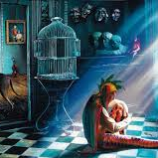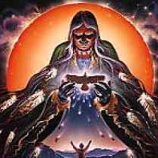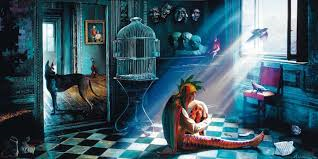Death is a whorl. Death is the face of the ally; death is a shiny cloud over the horizon; death is the whisper of Mescalito in your ears; death is the toothless mouth of the guardian; death is Genaro sitting on his head; death is me talking; death is you realizing this knowledge; death is nothing. Nothing! It is here yet it is not here at all.
I cannot tell you what death is like. But perhaps I could tell you about your own death. There is no way of knowing what it will be like for sure; however, I could tell you what it may be like. I cannot talk about death except in personal terms. You wanted me to tell you about death. All right! Then do not be afraid of hearing about your own death.
Death has two stages. The first is a blackout. It is a meaningless stage, very similar to the first effect of Mescalito, in which one experiences a lightness that makes one feel happy, complete, and that everything in the world is at ease. But that is only a shallow state; it soon vanishes and one enters a new realm, a realm of harshness and power. That second stage is the real encounter with the ally. Death is very much like this. The first stage is a shallow blackout. The second, however, is the real stage where one meets with death; it is a brief moment, after the first blackout, when we find that we are, somehow, ourselves again. It is then that death smashes against us with quiet fury and power until it dissolves our lives into nothing.
Death is nothing all the time. Nothing. It was a little dot lost in the sheets of your notebook. And yet it would enter inside you with uncontrollable force and would make you expand; it would make you flat and extend you over the sky and the earth and beyond. And you would be like a fog of tiny crystals moving, moving away.
Death is painful only when it happens in one’s bed, in sickness. In a fight for your life, you feel no pain. If you feel anything, it’s exultation.
One of the most dramatic differences between civilized men and sorcerers is the way in which death comes to them. Only with sorcerer-warriors is death kind and sweet. They could be mortally wounded and yet would feel no pain. And what is even more extraordinary is that death holds itself in abeyance for as long as the sorcerers need it to do so.
The greatest difference between an average man and a sorcerer is that a sorcerer commands his death with his speed. In the world of everyday life our word or our decisions can be reversed very easily. The only irrevocable thing in our world is death. In the sorcerers’ world, on the other hand, normal death can be countermanded, but not the sorcerers’ word. In the sorcerers’ world decisions cannot be changed or revised. Once they have been made, they stand forever.
For a seer human beings are either oblong or spherical luminous masses of countless, static, yet vibrant fields of energy, and only sorcerers are capable of injecting movement into those spheres of static luminosity.
In a millisecond they can move their assemblage points to any place in their luminous mass. That movement and the speed with which it is performed entails an instantaneous shift into the perception of another totally different universe.
Or they can move their assemblage points, without stopping, across their entire fields of luminous energy. The force created by such movement is so intense that it instantly consumes their whole luminous mass.
Death enters through the belly. Right through the gap of the will. That area is the most important and sensitive part of man. It is the area of the will and also the area through which all of us die. I know it because my ally has guided me to that stage. A sorcerer tunes his will by letting his death overtake him, and when he is flat and beings to expand, his impeccable will takes over and assembles the fog into the one person again.
It is his will which assembles a sorcerer, but as his old age makes him feeble, his will wanes and a moment unavoidably comes when he is no longer capable of commanding his will. He then has nothing with which to oppose the silent force of his death, and his life becomes like the lives of all his fellow men, an expanding fog moving beyond its limits.
To be a sorcerer is a terrible burden. I have told you that it is much better to learn to see. A man who sees is everything; in comparison, the sorcerer is a sad fellow.
Sorcery is to apply one’s will to a key joint. Sorcery is interference. A sorcerer searches and finds the key joint of anything he wants to affect and then he applies his will to it. A sorcerer does not have to see to be a sorcerer. All he has to know is how to use his will.
Related Articles













